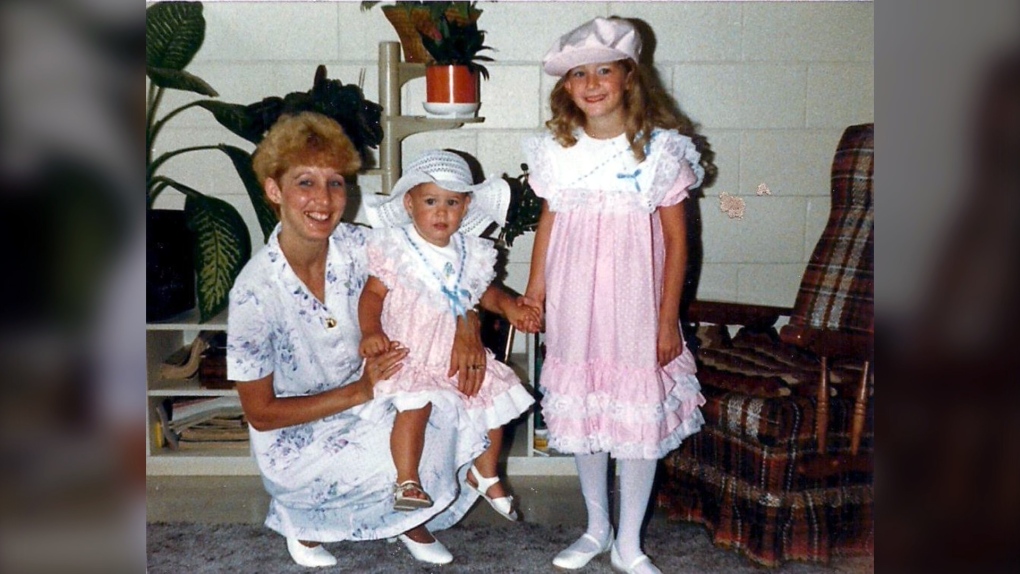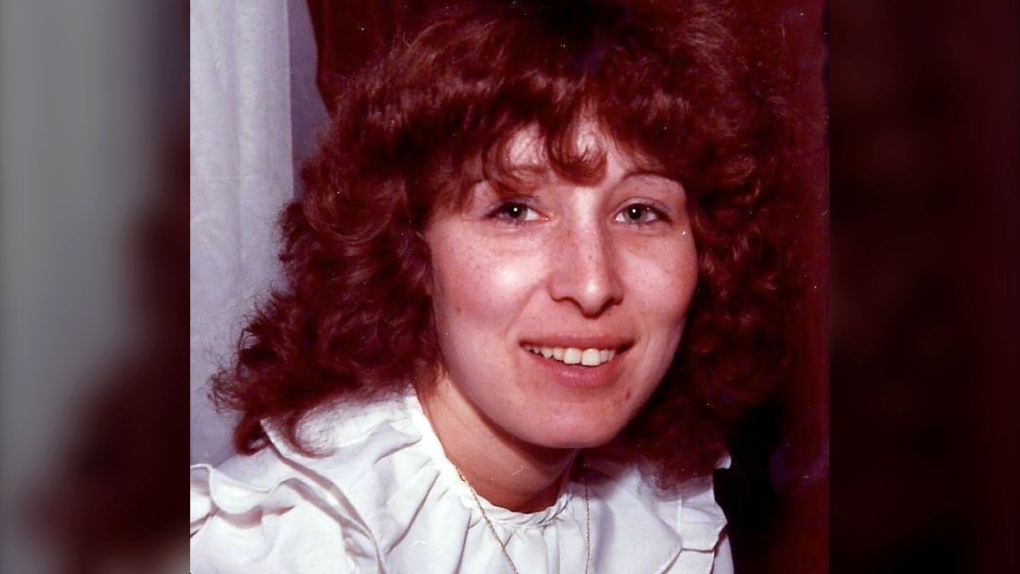Private investigator hunts for clues in missing patient cases at North Bay Psychiatric Hospital
Sitting in a small church basement in North Bay, Ont., Ellen White waits for an unusual group of congregants. They are not here for a traditional service, though they’ve come to this space to heal.
Roughly 15 people are in the room, sitting across staggered chairs and couches. Other than Ellen’s kind greeting, it’s unusually quiet.
Some family members clutch framed photos, while others awkwardly stare at the floor. That’s because they’re all connected in ways they never wanted to be: everyone here has had a loved one go missing.
Ellen is a private investigator that has brought them all together. She started a podcast called “Whereabouts Unknown”, vowing to voluntarily look into the lives of so many that are forgotten. In one year, she has uncovered hundreds of tips for 16 struggling families.
And she does it all for free. That’s because 30 years ago, when she started her career, she thought it was unfair that a steep price tag would stop many families from getting a private investigator.
“My family couldn’t afford it,” she admits to the group, “many of yours couldn’t either. So I looked at that time and started thinking, is this a two-tiered kind of system, where if you’ve got the money you find your missing person, but if you don’t, you won’t?”
- WATCH: Sandra McNeil on how the "Whereabouts Unknown" team helped her find information on the disappearance of her mother, Dawn Carisse
Sandra McNeil is in the room because she’s searching for her mother, Dawn Carisse, who disappeared 20 years ago. Dawn, a mother of 3, was just 43-years-old when she ran away from the North Bay Psychiatric Hospital. She vanished without a trace.
In 1992, Dawn was placed at this hospital because of a sudden, debilitating brain injury that caused short-term memory loss. The injury caused her to forget her keys, or remember whether she turned off the stove. The sickness put her children at risk and was soon too much for her husband to handle. He thought she would be safer at the psychiatric hospital.
 Dawn Carisse, a mother of 3, was just 43-years-old when she ran away from the North Bay Psychiatric Hospital.But keeping Dawn in that hospital was a challenge. Even though she had short-term memory problems, she was exceptionally sharp. Her first nurse, Darlene Gingras, remembers how she would hover near the ward door, warning she would run. She desperately wanted to go back north, to be with her kids, in Kirkland Lake.
Dawn Carisse, a mother of 3, was just 43-years-old when she ran away from the North Bay Psychiatric Hospital.But keeping Dawn in that hospital was a challenge. Even though she had short-term memory problems, she was exceptionally sharp. Her first nurse, Darlene Gingras, remembers how she would hover near the ward door, warning she would run. She desperately wanted to go back north, to be with her kids, in Kirkland Lake.
Dawn would repeat herself constantly, Gingras remembers: “She said, 'I’m Dawn the Running Bear and when I run, no one is going to catch me.'”
Dawn tried to run away from the hospital nine times before. Each time, she was found and brought back. One time, she even tried to hitchhike. However, on her 10th attempt, she disappeared. There was no note, few clues and her body has never been recovered.
Dawn was one of six patients who disappeared from the North Bay Psychiatric Hospital between 1966 and 2010. Unlike Dawn, who was supposed to be kept under 24 hour supervision and in a locked ward, some of the patients who disappeared had privileges to freely go in and out of the facility.
Six people disappearing from a mental health facility over a 40 year time span may seem high, but it’s sadly not, according to the limited Canadian data that exists.
Lorna Ferguson, a PhD candidate in sociology, runs the Missing Persons Research Hub at the University of Western Ontario to understand why and how people go missing.
In her recent co-authored paper from the University of Western Ontario, titled “Who is missing from Canadian Hospitals and Mental Health Units,” she attempts to address the gap that exists in this crucial data.
The report points out that although international literature suggests that a large volume of people go missing from hospital and mental health units, in Canada, “very little is known about patients reported missing from these locations.”
That knowledge deficit is concerning to Ferguson because so many social services can be improved for people most at risk. She, herself, was a runaway, who went missing at times during her teenage years. She says recently sharing her story has helped bridge valuable connections.
“It adds an element of genuineness,” says Ferguson, who works with 45 police departments on missing cases across the country. “But it’s not a reason that they trust me, I think it’s years and years of relationship building, keep showing up, and establishing a relationship of trust and openness.”
Ferguson’s co-authored study looked at 8,261 closed missing reports from a Canadian police service over a five-year period (2013-2018), and found that 924 patients, roughly 11%, disappeared from a hospital or mental health facility.
 Dawn Carisse, a mother of 3, was just 43-years-old when she ran away from the North Bay Psychiatric Hospital.Patients like Dawn—female, older adults who were runaways and had a habit of going missing—were most at risk from disappearing from a hospital or mental health institution. Mental disabilities and drug or alcohol dependencies also added to the risk of them disappearing.
Dawn Carisse, a mother of 3, was just 43-years-old when she ran away from the North Bay Psychiatric Hospital.Patients like Dawn—female, older adults who were runaways and had a habit of going missing—were most at risk from disappearing from a hospital or mental health institution. Mental disabilities and drug or alcohol dependencies also added to the risk of them disappearing.
Ferguson says the stigma around these types of cases can hinder research on the topic of missing persons as well. She points out how mental and cognitive disabilities just add another layer of complexity in understanding why someone disappeared.
“Specifically from hospitals, people are more likely to experience harm when they go missing from these locations because of those additional complexities,” Ferguson says. She points to higher rates of self harm, suicide rates, overdoses, and deaths by way of assaults and physical injuries these patients endure.
“For elderly patients, they are more likely to wander until they get stuck or hurt… so there’s almost always some element of harm,” she adds.
No one knows if Dawn Carisse was exposed to any level of harm. She vanished without a trace on August 9, 2001. It took 16 hours before police were even called in to look for her.
Ferguson says that’s unacceptable. “Even a 16-hour delay, that is substantial because most cases are resolved within 24 hours,” she says. “That is a huge misstep, huge time delay of information that would’ve honestly probably changed the nature of that case.”
As researchers tackle the wider systemic issues, private investigators like Ellen are doing the nitty gritty work on the ground. Talking to tipsters and trying to piece together loose ends about Dawn.
 Ellen White, a private investigator who started a podcast called "Whereabouts Unknown", is trying to find clues related to the disappearance of Dawn Carisse. Ellen has already dispelled many discrepancies in the original North Bay police report, and determined that Dawn likely left through a back door of a craft room earlier than police reported. Somehow Dawn managed to outsmart a team of nurses and doctors, and escape from the locked facility.
Ellen White, a private investigator who started a podcast called "Whereabouts Unknown", is trying to find clues related to the disappearance of Dawn Carisse. Ellen has already dispelled many discrepancies in the original North Bay police report, and determined that Dawn likely left through a back door of a craft room earlier than police reported. Somehow Dawn managed to outsmart a team of nurses and doctors, and escape from the locked facility.
Since Ellen’s podcast, hundreds of tips have flooded in, and potential sightings of Dawn have surfaced. Ellen passes on credible leads to the North Bay police to investigate. So far, they have ruled out all potential sightings. But because Dawn’s body has never been found, there’s always a possibility she is still out there.
It gives her daughter Sandra some hope that they will find answers, even two decades later. She is so grateful for volunteer detectives like Ellen, who are helping out perfect strangers.
“I think she's amazing… she has kept going where others have seemingly stopped or failed,” Sandra says.
“I'm so grateful for her help. I'm so blessed that she is willing to help my family hopefully find closure and answers.”
CTVNews.ca Top Stories

If you qualify for this tax credit, you can expect a payment in your bank account this week
The next quarterly GST/HST tax credit payment is expected to go out this week, according to the Canada Revenue Agency.
U.S. Supreme Court rules Trump has immunity for official, not private acts
The U.S. Supreme Court found on Monday that Donald Trump cannot be prosecuted for any actions that were within his constitutional powers as president, but can for private acts, in a landmark ruling recognizing for the first time any form of presidential immunity from prosecution.
These ultraprocessed foods may shorten your life, study says
Eating higher levels of ultraprocessed food may shorten lifespans by more than 10 per cent, according to a new, unpublished study of over 500,000 people whom researchers followed for nearly three decades.
WATCH: Ode to Newfoundland rings out at emotional internment of Unknown Soldier
As part of the emotional ceremony honouring Newfoundland and Labrador's Unknown Soldier, the province's national anthem, The Ode to Newfoundland, was sung. Military members received special permission from defence officials to salute the Ode.
This 12-year-old memorized the periodic table at age two. He's heading to NYU after finishing high school in just two years
Recent high school graduate Suborno Isaac Bari, 12, plans to start studying math and physics at New York University in the fall, but he’s already got his ambitious sights set on beginning a doctoral program.
Judge calls Jeffrey Epstein 'most infamous pedophile in American history' as he releases transcripts
A Florida judge released Monday afternoon the transcripts of a 2006 grand jury investigation that looked into sex trafficking and rape allegations made against the late millionaire and financier Jeffrey Epstein.
Eddie Murphy is still stung by that David Spade joke on 'Saturday Night Live'
Eddie Murphy is reflecting on some of the “cheap shots” he feels he’s taken over the years.
Possible indecent gesture at Euro 2024 game under investigation
England star Jude Bellingham is being investigated by UEFA over a potentially offensive gesture made during a European Championship win against Slovakia.
On July 1, 1916, a generation of Newfoundlanders died in one brief battle
Millions are celebrating Canada’s 157th birthday this year -- as they do every year -- with fireworks, food and family. In Newfoundland, it is a day of mourning for one of the bloodiest battles of the First World War.
Local Spotlight

LGBTQ2S+ newcomers celebrate first Pride in Canada
When Zhya Aramiy was living in Turkey and Iraq, he had to keep his Pride flags hidden away.
Raves, weddings, and field trips: GTA residents share memories of shuttered Ontario Science Centre
A rave at the Ontario Science Centre was the place where Greg LeBlanc says his relationship first began with his husband Mark in 1997.
Travellers watch as WestJet cancels flights with no end to mechanics strike in sight
Travellers flying with WestJet continue to watch as the airline cancels more flights due to a sudden strike by its mechanics union.
An unknown Newfoundland soldier killed in the First World War is being laid to rest
The remains of a soldier from Newfoundland killed in the battlefields of France during the First World War will be laid to rest in St. John's Monday, bringing an emotional end to a years-long effort in a place still shaken and forever changed by the bloodshed.
AHS water quality tests come back clean: Calgary moves forward with stabilizing service
The city is entering the final stages of resuming water service through its repaired feeder main, as water consumption continues to fall below the city’s threshold level.
'I am very proud': Manitoba grandfather and grandson graduate high school in same class
A grandfather and grandson duo proudly graduated alongside each other at the same northern Manitoba school.
'Absolutely amazing video': Basking shark spotted along eastern shore of Nova Scotia
A large basking shark was captured close to the shoreline on Nova Scotia's Eastern Shore.
World's largest hockey stick in B.C. to be chopped up, sold to collectors
The world's largest hockey stick could soon become the world's most in-pieces hockey stick as a Vancouver Island community prepares to tear down and carve up the Canadian landmark.
'Hanging on for her life': Sask. family desperate to bring home sick niece from Philippines
For half a decade, a Saskatoon family has been trying to bring their orphaned niece to Canada, they say now it’s a matter of life or death.














































